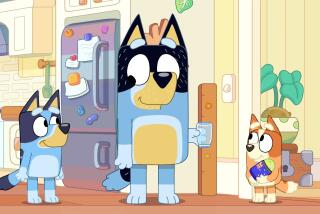Poignant, Funny and Successful Journey of Self-Discovery in ‘Bad Boy Bubby’
- Share via
Rolf de Heer’s “Bad Boy Bubby” is a bold, often comic contemporary parable of good and evil, ignorance and enlightenment. It will recall the two film versions of the saga of Kaspar Hauser, as well as Truffaut’s “The Wild Child,” in which a human being is cut off from the world until adolescence or adulthood.
Beyond the ever-potent premise of turning a naif loose in today’s society and seeing what happens, De Heer creates a spiritual odyssey, criticizing the divisiveness of organized religion and the way in which it can become an instrument of destruction rather than redemption. Painstakingly crafted in all aspects, ‘Bad Boy Bubby,” which is as funny as it is poignant and bizarre, is a tremendously ambitious film that succeeds triumphantly. It is a decided advance on De Heer’s “Dingo,” notable for its rare screen appearance of Miles Davis.
You might never guess that it would attain such scope or even be the kind of film it becomes from its first half-hour, which is sure to be a turnoff for some viewers. It takes place in a dank, drab, sparsely furnished two-room apartment in Australia’s Port Adelaide that looks more like a bunker than a home.
Bubby (Nicholas Hope) has never left it in his entire 35 years. His blowzy mother, Flo (Claire Bonito), is like one of those women who still occasionally turns up in the news: Someone with low intelligence who bears a baby out of wedlock and feels such shame that she keeps her child locked up until some chance discovery years later.
Bubby’s entire knowledge of the world comes from Flo, who owns neither TV nor radio, thus making him even more deprived than “Being There’s” Chauncey Gardiner. Every morning Flo bathes her son and herself, prepares breakfast for them, then has lusty sex with her son as matter-of-factly as the other routines, puts on a gas mask and leaves for the day, presumably to go to work. She’s convinced Bubby over the years that the air outside is poisonous and that he must not venture forth on pain of death. In her dim, perverted way, Flo loves Bubby but, in addition to confining him, she often treats him brutally.
To say the least, the entire section of the film that takes place inside the apartment is bizarre in the utmost, steeped in dark, savage ignorance. After 35 years, Bubby’s father, Harold (Ralph Cotterill), a low-life bogus priest, shows up, eager to make “an honest woman” of Flo at long last.
Bubby’s world is swiftly turned upside down and dire events propel Bubby out into the streets. At this point Bubby’s mental capacity is pretty much limited to an expert gift for mimicry. As you might expect, he is confronted with kindness, indifference and outright hostility in a wide variety of circumstances, but two encounters prove crucial. He falls in with an easy-going rock ‘n’ roll band, and at about the same time he paws a pretty, plump young woman aptly named Angel (Carmel Johnson, a radiant, selfless actress) who is naturally repelled and enraged. But his second encounters with the rockers and with Angel will transform his life.
On the one hand, he scores a hit as a rock singer, where a litany of all the abusive remarks hurled at him turn him into a popular rapper--ah, what a comment on a certain level of pop music--and on the other, Bubby’s instant rapport with the severely disabled people in Angel’s charge captures her imagination. She seems not to recognize him from their initial ugly encounter. Bubby is on his great adventure of self-discovery.
De Heer is admirably assured in his ability to take us on Bubby’s amazing journey, and he has the gift of inspiring his actors to bare their souls (and often their bodies as well). “Bad Boy Bubby” must be taken figuratively, of course, rather than literally: For starters, it’s unlikely that a 35-year-old man confined all his life would be as trim and agile as Hope.
The point is that De Heer and Hope succeed in persuading us to go along with the “reality” of the film, which is concerned with matters of the heart and mind rather than appearances. “Bad Boy Bubby” is that rare film that progresses from dark to light, emerging a celebration of the soul.
* Unrated. Times guidelines: It includes scenes of sex and violence, strong language, cruelty to animals and is decidedly a film for adults.
‘Bad Boy Bubby’
Nicholas Hope: Bubby
Carmel Johnson: Angel
Claire Benito: Mom
Ralph Cotterill: Pop
A Bubby P/L (Adelaide)-Fandango (Rome) co-production, with the participation of the Australian Film Finance Corp. in association with the South Australian Film. Corp. Writer-director Rolf de Heer. Producer Domanico Procaci, George Draskovic. Lead cinematographer Ian Jones. Editor Suresh Ayyar. Costumes Beverly Freedan. Music Graham Tardif. Production designer Mark Abbott. Art director Tim Nicholls. Running time: 1 hour, 50 minutes.
*
BE THERE
“Bad Boy Bubby”: Exclusively at the Nuart, 11272 Santa Monica Blvd., West L.A., (310) 478-6379.
More to Read
Only good movies
Get the Indie Focus newsletter, Mark Olsen's weekly guide to the world of cinema.
You may occasionally receive promotional content from the Los Angeles Times.










